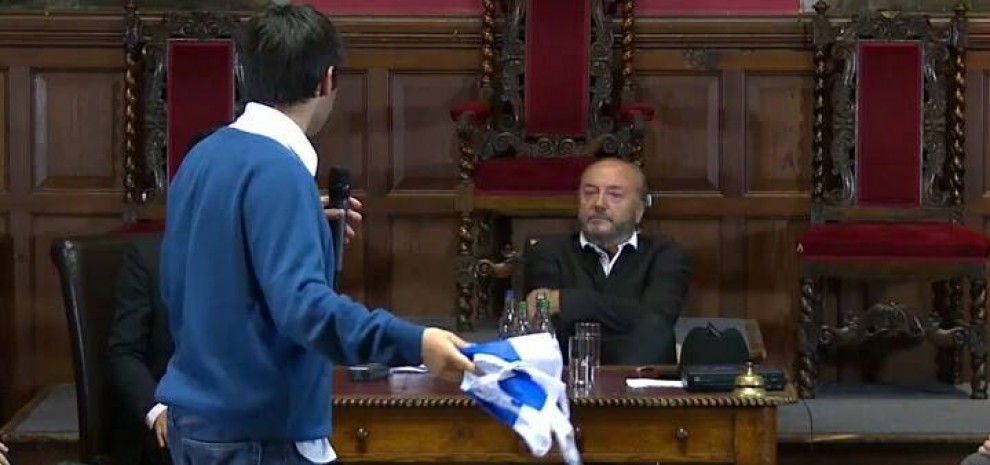Last night Jews For Justice for Palestinians hosted Dr Anat Matar and Abeer Baker at the Indian YMCA to publicise their new book Threat: Palestinian Political Prisoners in Israel.
For Matar, a senior lecturer in the Philosophy Department at Tel Aviv University, it was a warm anti-Israel welcome back to London.
In February 2010 she spoke at SOAS where she called for an economic, cultural and academic boycott of Israel. However, saving her own skin, she said she didn’t want Israelis boycotted if they were “refusniks and great anti-Zionists”.
Abeer Baker, who describes herself as a Palestinian citizen of Israel, is a human rights lawyer and runs the Prisoners’ Rights Clinic at Haifa University’s Law Faculty. She received her Law degree from Haifa Uni. in 2001 and between 2001 – 2006 she worked for Adalah, the Legal Center for Arab Minority Rights in Israel.
Matar started by saying that since 1967 a minimum of 650,000 Palestinians have been in Israeli prisons at some stage or other and for varying lengths of time, which equates to every fourth Palestinian.
She said the estimate could even be as high as a million!
Israeli prisoners, she said, are treated as normal criminals while all Palestinians are immediately classed as “security prisoners”, whatever their offence, and that the chances of parole for a “security prisoner” are much lower than that for a Jewish terrorist.
She concluded that this Palestinian mass imprisonment, which has excluded a quarter of the population from Palestinian society, has changed the way Palestinian political life is built and amounts to racial discrimination.
She mentioned that many Palestinians are captured at the regular non-violent Friday protests at the “apartheid wall”. Many are held, some are indicted and some serve long prison terms with no parole in contrast to ultra right-wing settlers.
Baker told us that Israeli prisons are similar to “the occupation”; they are not for punishment, but to exclude Palestinians from daily public life and to weaken their political struggle.
Assassination, she said, was the harshest way to do that and then comes the Israeli prison system.
Putting Palestinians behind bars was the equivalent of the “apartheid wall” and that Palestinian families spend all their time worrying about their imprisoned relation instead of engaging in the struggle against the occupation.
She also said it was a breach of the Geneva Convention for Israel to move Palestinians from the occupied territories into Israel to imprison them.
Next she recited the torture meted out by Shabak, which included, sleep deprivation, physical torture (including beating) and shackling to chairs. Palestinians were not allowed access to a lawyer for three months, the prison cells are narrow, have special lighting and the walls are too tough to lean on.
All this, she said, was intended to make Palestinian prisoners more likely to confess.
She also spoke of Palestinians never properly getting their lives back after their release as they find it hard to get a work permit and they have their movements restricted.
She claimed that the only way a Palestinian prisoner would be allowed to use a phone is if he or she renounced all allegiances to their hostile organisation. But, because they are put in the same cell as people from their own organisation it was impossible for them to do that. However, Yigal Amir is allowed to call his wife.
During the Q&A I asked how practical it was for Israel to imprison a Palestinian anywhere else but Israel and how practical it was to give a Palestinian prisoner parole, it being unlikely they would return to prison if recalled.
I suggested that racism was not at play if there was such different treatment, but that conditions on the ground may be determining factors. For example, the settlers were supportive of Israel, while the Palestinians were not.
Matar said the settlers were not supporters of Israel from they way they set fire to mosques and Baker asked me to imagine a settler and a Palestinian raping a woman: “Would you say you should pardon the settler?” she asked.
I said there was no way a settler would be pardoned for raping a woman, but Matar interrupted with:
“The settler wouldn’t even get accused of rape.”
We almost got through the evening without the obligatory Holocaust analogy. But earlier on we had been told about Palestinians having to pay for their own food in prison, so that even in prison Israel is making money out of them.
Someone then said that it reminded him of Jews sent to Auschwitz by the Nazis being forced to buy their own train tickets.
Still, these two women earn a living from Israel’s academic institutions, while being allowed to write a book and travel the world describing how evil Israel is. Not bad for such such an oppressive state.
The irony was, as ever, lost on the audience.
(For the record Matar and Baker said that they did not agree with the way Gilad Shalit is treated)

